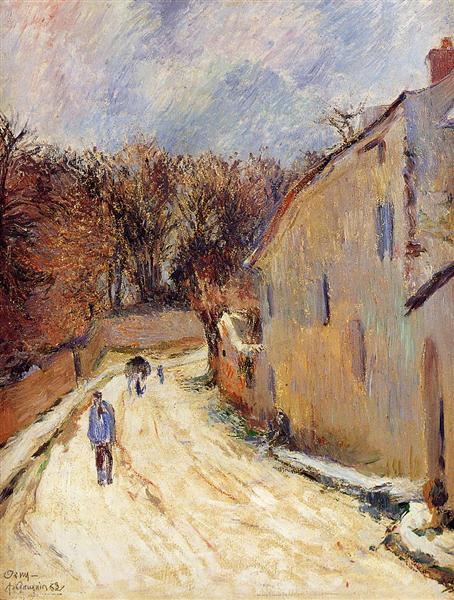Kuvaus
Paul Gauguinin teos "OSNY - Rue de Pontoise - Winter - 1883" on upea esimerkki hänen varhaisesta vaiheestaan maalarina, jossa häntä edelleen pyrittiin määrittelemään taiteellisen äänensä ja hänen erottuvan tyylinsä. Tässä maalauksessa kirjoittaja vangitsee Pariisin esikaupungin OSNY: n maaseutuympäristön talviaseman aikana käyttämällä palettia, joka herättää sekä luonnon rauhallisuuden että melankolian tänä vuoden aikana.
Ensi silmäyksellä kangas esitetään OSNY: n kadujen edustajana, missä lumi kattaa tiet ja kertyy varovasti taloihin. Kriitikot ovat tulkittaneet lumen eri tavoin, ja tässä työssä se näyttää palvovan maisemaa, muuttavan sitä ja antaen sille melkein kuvallisen laadun. Pääasiassa kylmät sävyt ovat vallitsevia maalauksessa, sinisellä ja valkoisilla vivahteilla, jotka hallitsevat koostumusta. Nämä värit luovat rauhallisen ilmakehän ja tarjoavat samalla tietty talveen liittyvä säästö.
Koostumuksen kannalta taulukko näyttää buddhalaisten talojen huolellisen asennuksen, jotka ovat linjassa kadun varrella, joka kulkee kuvatilan syvyyteen. Tämä koneen käyttö, joka ohjaa pohjaa, antaa perspektiivin ja kolmen ulottuvuuden tunteen. Lisäksi kehystys on taitava korostamaan arkkitehtonisten elementtien ja luonnollisen ympäristön vuorovaikutusta, esittäen harmonian, joka heijastaa maaseudun elämän estetiikkaa. Talot, joiden katot on peitetty lumen peitossa, näyttävät sulavan maisemaan, ikään kuin ne olisivat olennainen osa sitä.
Vaikka työssä ei ole selvästi rajattuja ihmishahmoja, elämäehdotus on kiistaton. Hahmojen puuttuminen kohtauksesta, jonka päivittäisestä toiminnastaan huolehdittavat ihmiset olisivat voineet asua, luo kaiku yksinäisyydestä ja hiljaisuudesta, talven ominaisuuksista. Tämän valinnan kautta Gauguin tarjoaa katsojalle heijastuksen hetken, joka kutsuu sinut pohtimaan merkityksen etsimistä maisemasta, joka näyttää olevan levossa.
Impressionismin vaikutus näkyy "OSNY - Rue de Pontoise - Winter" -tapahtumassa, etenkin tavalla, jolla Gauguin vangitsee kohtauksen valon ja ilmapiirin. Vaikka ensimmäisissä tuotannoissaan voit nähdä Gauguinin tutkivan sen aikalaisten tekniikoita, ominaisuudet, jotka erottaisivat sen ja jotka kehittyvät niiden kypsimpiin työhön, kuten luonnonnollisen värin suurempi käyttö ja muotojen yksinkertaistaminen. Erityisesti tätä työtä voidaan pitää siltana impressionistisen herkkyyden ja tulevan symbolismin ja postimpressionistisen kokeilun välillä, jotka kuvaavat hänen uransa.
"OSNY - Rue de Pontoise - Winter" ei ole vain todistus ympäristöstä, jonka Gauguin havaitsi, vaan myös heidän tunteidensa heijastus ja visuaalisen kielen etsiminen, joka vangitsi paitsi ulkonäön, myös elämän olemuksen elämässä Sen erilaiset ilmenemismuodot. Tämä maalaus on ikkuna tuolloin maaseutumaailmaan, jäädytetty hetki ajassa, joka kutsuu taiteen pohtimista ja arvostusta ihmisen ja luonnollisen kokemuksen tutkiessaan. Jokaisesta aivohalvauksesta ja jokaisesta värin vivahteesta tulee vuoropuhelu luonnon kanssa, mikä paljastaa Gauguinin kyvyn muuttaa jokapäiväistä jotain syvästi herättävää ja merkittävää.
KUADROS ©, kuuluisa maali seinällesi.
Käsivalmistetut öljymaalaukset, ammattitaiteilijoiden laadun ja erottuvan sinetin kanssa KUADROS ©.
Kuvien jäljennöspalvelu tyytyväisyystakuu. Jos et ole täysin tyytyväinen maalauksen jäljennökseen, palautamme rahasi 100%.

